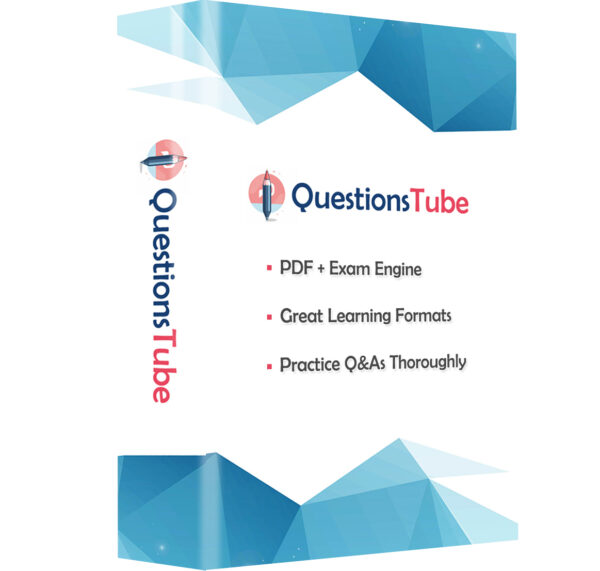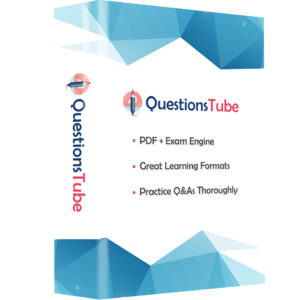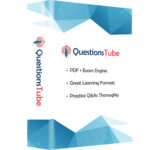Order our MuleSoft Associate Practice Questions Today and Get Ready to Pass with Flying Colors!
Exam Code: MuleSoft Associate
Exam Name: Salesforce Certified MuleSoft Associate
Exam Q&As: 40 Q&As
Last update: July 10, 2025
Product Description
Acing the Salesforce MuleSoft Associate Exam with QuestionsTube
The Salesforce Certified MuleSoft Associate certification, formerly known as the MuleSoft Certified Integration Associate exam, is now part of the Salesforce Associate certification program after a shift from the MuleSoft certifications. This foundational certification is intended for those keen on contributing to a MuleSoft project team in an informed capacity. It’s essential for candidates to be familiar with fundamental integration and API-led connectivity terms and principles, and to comprehend the advantages offered by the Anypoint Platform in system integration and API management.
Read Salesforce MuleSoft Associate Exam Topics
- Identify the common reasons that IT integration projects frequently fail.
- Define the IT delivery gap and describe MuleSoft’s approach to closing it.
- Describe the characteristics and roles of an API-led IT delivery model that emphasizes both production and consumption.
- Describe the common delivery methodologies for integration projects.
- Identify key DevOps practices and tools for building, testing, deploying, and delivering integration solutions.
- Identify and describe the steps of the design, implement, and management stages of MuleSoft’s recommended product-centric API lifecycle.
- Describe the roles and responsibilities within a typical MuleSoft integration project team.
- Distinguish between Infrastructure as a Service (IaaS), Platform as a Service (PaaS), and Software as a Service (SaaS).
- Identify the types of virtualization, computing, and storage infrastructure required by enterprise systems and describe the principles of system scalability.
- Classify and describe common networking protocols used in system communication.
- Recognize the differences between common data formats (for example, XML, YAML, and JSON) used in transformations and configuration files.
- Define and describe the core concepts of API and enterprise system security.
- Identify and describe the HTTP components that enable RESTful web services.
- Define and correctly use the terms API implementation, API proxy, API interface, API client/consumer, and API invocation.
- Identify and classify RESTful, SOAP, AsyncAPI, and GraphQL APIs.
- Classify and describe the characteristics of common enterprise systems.
- Classify and describe the tradeoffs of legacy and modern integration approaches.
- Given a complex business problem, identify the fundamental integration use cases that can deliver an end-to-end business solution.
- Describe the purpose and function of the different classes of integration technologies.
- Identify the types of integration technologies that are most suitable to realize different integration use cases and business scenarios.
- Deconstruct an integration solution into its integration system constituents.
- Describe the differences between the request-reply, one-way, multicast, batch, and stream interaction patterns.
- Explain the differences between the aggregation, orchestration, and choreography composition patterns.
- Describe the purpose of an API specification and the benefits of following a design-first approach to API development.
- Describe and compare observability approaches for integration solutions including logs, metrics, and tracing.
- Design MuleSoft applications using common features of core connectors.
- Describe the differences between cloud, hybrid, and on-premise deployment architectures.
- Describe the differences and tradeoffs between monolithic and microservices application architectures.
- Describe the difference between a service mesh and an API gateway.
- Identify the primary components of Anypoint Platform and their benefits for system integration.
- Identify and describe the common characteristics of popular Anypoint Connectors for connecting to software applications, databases, and protocols.
- Identify the components and describe the benefits of the Anypoint Platform runtime planes and control planes.
- Describe the MuleSoft-hosted and customer-hosted deployment options for Anypoint Platform.
- Describe the uses and benefits of the Anypoint Platform development tools and languages for integration developers and DevOps teams.
- Describe and classify the types of reusable assets in Anypoint Exchange that form the building blocks of integration solutions.
- Identify the primary components of Anypoint Platform and their benefits for API management.
- Identify how MuleSoft products realize the goals of full lifecycle API development and Universal API Management (UAPIM).
- Explain the advantages of API-led connectivity with Anypoint Platform over other integration and API management approaches.
Focus on the MuleSoft Associate exam materials of QuestionsTube Now. We have the latest study materials with actual questions and answers to ensure that you can pass the Salesforce MuleSoft Associate exam successfully. All the MuleSoft Associate questions and answers are based on the exam topics to make you have a deep understanding and pass smoothly.
MuleSoft Associate study materials have proven to be very effective:
It was a wonderful experience with the MuleSoft Associate study guide of QuestionsTube for Eric. When a friend recommended QuestionsTube’s MuleSoft Associate study guide, he was hesitant. He had never used an online study guide before, and he wasn’t sure if he could trust it. But his friend was insistent, so he decided to give it a try. The first thing he noticed about the study guide was how easy it was to use. The layout was clean and intuitive, and the information was organized in a way that made sense. He started by reading all the MuleSoft Associate practice questions and answers, which helped me identify my strengths and weaknesses. As he worked his way through the MuleSoft Associate study guide, he was impressed by how comprehensive it was. It covered all the topics that he knew would be on the exam, and it went into detail on each one. The explanations were clear and easy to understand, and there were plenty of examples to help me grasp the concepts. In the end, he passed the exam with flying colors. And he knew that he couldn’t have done it without QuestionsTube’s MuleSoft Associate study guide. It had given me the knowledge and confidence he needed to succeed.
What kind of superior service will we provide for your MuleSoft Associate exam preparation?
- Latest MuleSoft Associate Exam Questions with Precise Answers: All the questions and answers will be double-checked by the experts to make sure they are useful for your review.
- Convenient PDF & Visual Exam Engine for MuleSoft Associate learning: To make sure that you can read all those latest Salesforce MuleSoft Associate questions and answers clearly, we have two formats to help you start learning. The convenient PDF file can be read on any device, and the visual exam engine helps you practice the exam like attending a real test. You can choose one of them to prepare for your exams, but both are recommended.
- Instant Download Without Waiting: It is easy to get the MuleSoft Associate exam questions from QuestionsTube. After your order(s) are placed successfully, you can download your file(s) at once without waiting.
- Always Having the Latest Exam Questions: You can choose as the regular customer(s) of QuestionsTube, then you can enjoy free updates for having the latest exam questions. As you like, you can choose a 3-month free update, a 6-month free update, or a one-year free update.
- Without any Burden by Using the Materials: The aim of providing you with great MuleSoft Associate exam questions and study materials is to help you achieve success. If using the materials and do not access them successfully, you can get a refund without any burden. For more details, please read our Refund Policy page.










Reviews
There are no reviews yet.